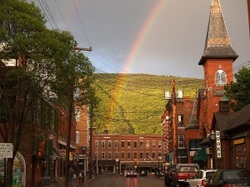
That was followed by a downbeat, i.e., realistic, assessment of the state of the climate and what we might expect in the near and medium-term future, by Robert Repetto of the United Nations Foundation, and Jonathan Lash, former head of the World Resources Institute and current president of Hampshire College, who told a more hopeful story of how his undergraduates had won a national invention competition against grad students from other schools, "because they didn't know they couldn't."
This is how organizers defined "slow living": "[It is] a more reflective approach to answering how we live, work and play as human beings on a fragile Earth. When we Live Slow, we give back and become more strongly connected to the Earth, to our communities, to our neighbors and to ourselves. A Slow Life is one that seeks the right balance between spirituality, sensuality, introspection and community. A Slow Life recognizes our role as members of our bioregions and of our Earth, taking a nourishing, rather than extractive approach."
A big highlight for me was a workshop by Erica Wheeler, a singer-songwriter who also performed at some of the plenaries. She writes place-based songs and sang one about a farmer who regretted selling his farm that's "all asphalt now." In the workshop she asked folks to write down some memories of favorite or impactful places. When two people shared their writing, she made up scraps of song on the spot. And they were not fluffy memories, either.
I had arranged to camp out at the rural home of a woman who welcomed three out-of-town attendees. When I went to bed Wednesday night around 10:30 p.m., the stars were brilliant. I am utterly star-deprived on almost all the other days of my life, so it was a big thrill to have a clear night. By the next night it was cloudy, and by Friday morning it was raining -- a steady but not too heavy rain that kept up all day and all night. Thursday evening, before the rain, I also enjoyed walking back and forth across the bridge spanning the Connecticut River and connecting Vermont to New Hampshire. Being a flatlander from the Connecticut shoreline, I'm used to seeing the lower end and mouth of the river, where it's really wide. Here it was way smaller, but beautiful.
Another highlight was hearing Gus Speth, former dean of the Yale School of Forestry and Environmental Studies (and many other top government and non-profit environmental positions), who now sees environmental issues and climate change through a broader lens, including the changes in the global economy needed to halt what looks like humans' free fall into climate chaos. You can listen to/read an excerpt of his talk at Between the Lines.
For more on the Summit, visit their website, which includes some video and will feature postings from several bloggers.
 RSS Feed
RSS Feed
